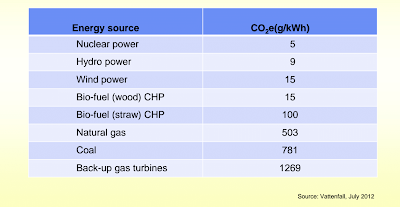So what?
 The use of nuclear energy as a power source has some very important benefits. It's more economically viable than other forms of renewable energy because it is much easier to convert existing fossil fuel plants to nuclear plants. Also stocks of usable minerals in nuclear energy production if used with forms of reprocessing will outlast stocks of fossil fuels. But most importantly in this day and age where we're desperately trying to combat global climate change, nuclear energy is exceedingly low-carbon.
The use of nuclear energy as a power source has some very important benefits. It's more economically viable than other forms of renewable energy because it is much easier to convert existing fossil fuel plants to nuclear plants. Also stocks of usable minerals in nuclear energy production if used with forms of reprocessing will outlast stocks of fossil fuels. But most importantly in this day and age where we're desperately trying to combat global climate change, nuclear energy is exceedingly low-carbon.
However since the discovery that this energy was exploitable, it has been an issue of debate within and amongst governments, NGOs, and the general public. Why you may ask? Well mainly because it's really scary. The energy in nuclear materials can manifest as radiation, harmful waves that can cause cancer and organ failure; not only this, the weaponisation of this energy in the form of bombs, something that dominated politics of the latter half of the 20th century, and even in this modern day and age continue to be a worry, are no joking matter. However a slightly less explosive issue is that of the radioactive byproducts of nuclear energy production: nuclear waste. Nuclear waste can be toxic to humans for timescales potentially up to a million years and with nuclear energy being such a new field of study, it's not something we have a whole lot of experience in dealing with. However in typical human fashion, in our scramble to create a cheap, low-carbon fuel source, we've neglected to make sure we have plans in place to deal with its consequences, and nuclear waste isn't a consequence we can just walk away from.
This issue of waste is one I'd like to discuss in my blog not only because I find it interesting, but also because I don't hear or see it talked about in nearly enough depth. In the next ten weeks I'll explore the different elements that characterise the issue and hopefully give you, the reader a better idea of the science and story behind the nuclear energy debate.

Such an interesting yet controversial topic. Looking forward to reading your analysis of a subject, that as an environmentalist, has always preoccupied me!
ReplyDeleteThanks Chris! Hope you enjoy my future posts just as much
DeleteI'm sure you've already seen this, but just in case, here's quite an interesting article about how the UK is potentially using nuclear waste as political leverage in the midst of Brexit discussions: https://www.theguardian.com/environment/2017/jul/19/uk-threatens-to-return-radioactive-waste-to-eu-without-nuclear-deal
ReplyDeleteIt's interesting to think about the geopolitical consequences (as well as consequences to human/ecological health) of waste.
Hey Mari! Interesting read, I hadn't heard of the UK trying to manipulate Brexit discussions like that before. Something to consider (and something I'll cover in a future blog post) is that the EU (specifically France, Finland and Sweden) are much more prepared and have actual plans to deal with nuclear waste whereas the UK is very much behind.
ReplyDeleteThanks for stopping by! :)
I didn't think I'd have a few chuckles reading about nuclear energy - fair play Luca, not an easy task! Looking forward to reading your next posts, particularly as nuclear energy and waste is something I really should and want to know more about.
ReplyDelete